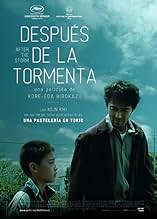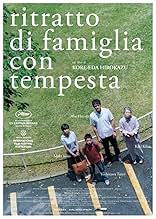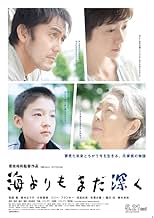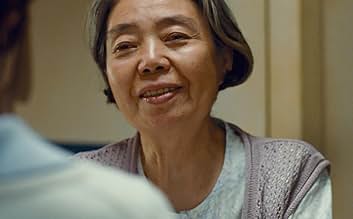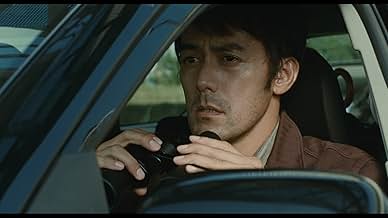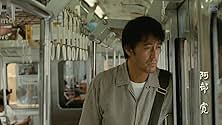IMDb RATING
7.4/10
13K
YOUR RATING
After the death of his father, a private detective struggles to find child support money and reconnect with his son and ex-wife.After the death of his father, a private detective struggles to find child support money and reconnect with his son and ex-wife.After the death of his father, a private detective struggles to find child support money and reconnect with his son and ex-wife.
- Awards
- 2 wins & 13 nominations
Storyline
Did you know
- TriviaAlbeit released later, this film wrapped earlier than Koreeda's previous film Our Little Sister (2015). The month-and-a-half filming of After the Storm took place starting in May 2014 in between the production of Our Little Sister, which was shot throughout a year.
- Quotes
Shinoda Yoshiko: I wonder why it is that men can't love the present. Either they just keep chasing whatever it is they've lost... or they keep dreaming beyond their reach.
- ConnectionsReferences My Neighbor Totoro (1988)
- SoundtracksShinkokyû
Music and lyrics by Takashi Nagazumi
Performed by Hanaregumi
Courtesy of Victor Records and Speedstar Records
Featured review
Fear that your children may mimic your worst qualities is the driving force in Hirokazu Koreeda's ("Our Little Sister") After the Storm (Umi yori mo mada fukaku), a compassionate look at the struggles of a Japanese family. Its title derived from the lyrics of an old pop song, the film is set in Kiyose, a city near Tokyo where it is beautifully shot in the housing compound where Koreeda grew up by cinematographer Yutaka Yamasaki. Ryota Shinoda (Hiroshi Abe, "Everest: The Summit of the Gods") is a novelist who has not had a story published in fifteen years and is forced to work for a private detective agency, which he claims is solely to do research for his next novel. Using his detective job to spy on Kyoko's new boyfriend with the help of his young detective-partner (Sosuke Ikematsu, "Mubansô"), he learns that she is dating a wealthy businessman who is intrusive in Shingo's life.
A gambling addict who squanders much of his earnings, Ryota's relationship with his young son Shingo (Taiyo Yoshizawa) is in jeopardy as his ex-wife Kyoko Shiraishi (Yoko Maki, "Like Father, Like Son") threatens to keep him from seeing Shingo until he catches up on his child support payments. The first time we see Ryota we are not impressed. He is going through his recently deceased father's private belongings to see if he can find anything that he could sell. It seems, however, that his father was also a gambler and Ryota's search might have been better conducted at the local pawn shop. While it is clear that he is not a role model for parenting, Ryota is man of considerable charm and Koreeda does not stand in judgment of his actions but depicts his travails with warmth and humor. We see that in spite of his dubious habits, his sister (Satomi Kobayashi) and his employer are both willing to lend him money.
With the help of his own mother, the spunky and very astute Yoshiko (Kirin Kiki, "Our Little Sister"), Ryota has his sights set on reuniting with Kyoko and Shingo. His love for his son is very real but he seems incapable of breaking from his demons, the same ones that dominated his father's life. Attempting to win back Shingo's love, he takes him out for a hamburger, buys him new shoes, and visits Yoshiko, the boy's beloved grandmother. Knowing that a typhoon is on the way, the family comes together to spend the night and to wrestle with the direction that their lives will take. "Why can't men ever love the present," Yoshiko wonders, highlighting an important message of the film, that people must accept the reality of how they really are.
While there is truth to the idea that we must accept who we are, there is a thin line between accepting your limitations and recognizing that you have the power to transform your life, to live the life you want rather than the life you are resigned to. Also, while the idea that sons will always take after their father is accepted without question, the reality in my experience is that sons will either take after their fathers or make very sure that they do not. After the Storm is one of Koreeda's best films and, as always, he elicits exceptional performances from children as well as brilliant takes by Kiki and Hiroshi Abe, but, in my view, its message is debatable.
A gambling addict who squanders much of his earnings, Ryota's relationship with his young son Shingo (Taiyo Yoshizawa) is in jeopardy as his ex-wife Kyoko Shiraishi (Yoko Maki, "Like Father, Like Son") threatens to keep him from seeing Shingo until he catches up on his child support payments. The first time we see Ryota we are not impressed. He is going through his recently deceased father's private belongings to see if he can find anything that he could sell. It seems, however, that his father was also a gambler and Ryota's search might have been better conducted at the local pawn shop. While it is clear that he is not a role model for parenting, Ryota is man of considerable charm and Koreeda does not stand in judgment of his actions but depicts his travails with warmth and humor. We see that in spite of his dubious habits, his sister (Satomi Kobayashi) and his employer are both willing to lend him money.
With the help of his own mother, the spunky and very astute Yoshiko (Kirin Kiki, "Our Little Sister"), Ryota has his sights set on reuniting with Kyoko and Shingo. His love for his son is very real but he seems incapable of breaking from his demons, the same ones that dominated his father's life. Attempting to win back Shingo's love, he takes him out for a hamburger, buys him new shoes, and visits Yoshiko, the boy's beloved grandmother. Knowing that a typhoon is on the way, the family comes together to spend the night and to wrestle with the direction that their lives will take. "Why can't men ever love the present," Yoshiko wonders, highlighting an important message of the film, that people must accept the reality of how they really are.
While there is truth to the idea that we must accept who we are, there is a thin line between accepting your limitations and recognizing that you have the power to transform your life, to live the life you want rather than the life you are resigned to. Also, while the idea that sons will always take after their father is accepted without question, the reality in my experience is that sons will either take after their fathers or make very sure that they do not. After the Storm is one of Koreeda's best films and, as always, he elicits exceptional performances from children as well as brilliant takes by Kiki and Hiroshi Abe, but, in my view, its message is debatable.
- howard.schumann
- Oct 15, 2016
- Permalink
- How long is After the Storm?Powered by Alexa
Details
- Release date
- Country of origin
- Official site
- Language
- Also known as
- Después de la tormenta
- Filming locations
- Kiyose, Tokyo, Japan(Train station)
- Production companies
- See more company credits at IMDbPro
Box office
- Gross US & Canada
- $272,132
- Opening weekend US & Canada
- $27,880
- Mar 19, 2017
- Gross worldwide
- $5,382,886
- Runtime1 hour 58 minutes
- Color
- Sound mix
- Aspect ratio
- 1.85 : 1
Contribute to this page
Suggest an edit or add missing content



